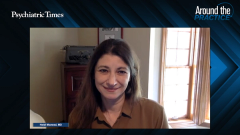
Clinical Impressions from Patient Case #1
Heidi Moawad, MD; Phyllis C. Zee, MD, PhD; and Ruth Benca, MD, PhD, share details about a patient case that may impact clinical considerations and therapeutic decision-making.
Episodes in this series

Thomas E. Scammell, MD: Dr. Moawad, let's just turn to you for your overall impressions of this case and what stands out to you.
Heidi Moawad, MD: Actually, this patient's history is, in many ways, so typical because he is attempting to explain his symptoms with the things that are going on in his life. He is not doing well in school. He is flunking his classes. And so he is describing the depression, the sleepiness, all of these things based on the events that are going on for him. Especially at this age, this is a normal way that a young person would describe what is going on with them. One thing that I do think that stands out is that he has been taking medication for a while and that can really have a lot of side effects and can change things that he doesn't seem to have been maybe warned about, what side effects to look for. I think that is coloring what's going on here. But the other thing that is really standing out is how persistent all of this is. A lot of times, when young people in particular try to explain symptoms with what is going on in their life, it shouldn't be so prolonged. In this case, we're talking about a 19-year-old, and he has been dealing with this since he was 16. It is definitely something to look at deeper.
Thomas E. Scammell, MD: He is problematically sleeping. How would you tease apart this question of depression and narcolepsy in this guy?
Heidi Moawad, MD: Well, I think I actually do think that the scales would be helpful in this type of situation. One thing is that it opens up the discussion. It helps him to consider sleepiness in isolation from mood and to consider how much he's been sleeping, how much he falls asleep. Also, it allows for a discussion about the fact that this is not necessarily normal and that he really needs to start tracking this a little bit more. I think it is just an opening for sleep studies, which would be more definitive for him.
Thomas E. Scammell, MD: It sounds like just with this kind of history, after taking a good history, you would certainly move on to doing an overnight polysomnogram and multiple sleep latency test.
Heidi Moawad, MD: Yeah. Given how long he has been dealing with this and that it seems that the conditions in his life that he is blaming all of this on are not getting—as probably things are fluctuating during summer vacation and things like that—it doesn't seem like his symptoms are getting better during those times.
Phyllis C. Zee, MD, PhD: One thing that I notice is that we have this strong focus on excessive daytime sleepiness, daytime functioning, and there have been no questions about his nighttime sleep, being a college student, how regular sleep is. I think Dr. Benca brought up the issue of sleep deprivation being very common in this group. I think that's probably something I would be really interested in knowing about his sleep quality, the regularity as well, because that is important not to miss that in the history.
Thomas E. Scammell, MD: I think you're highlighting the fact that way more common than narcolepsy is insufficient sleep, circadian phase delay, things like this are really what it's most typically causing these kinds of problems in this stage group. Dr. Benca, were you going to say something?
Ruth Benca, MD, PhD: Yeah. Certainly, all of that is true, but it is also an age group where narcolepsy sometimes appears. We do have to keep that in mind, but I agree with Dr. Zee that particularly in young people like this, we do need to get a very careful sleep history. Does he have early morning classes and is staying up really late at night? Does he have an irregular pattern social jet lag, whatever that is contributing to his sleepiness? The other concern I have about him is his substance abuse history. Again, is he self-medicating because he is sleepy, or is he sleepy because he's addiction-prone in using stimulants that have their side effects when you withdraw excessive sleepiness, like the cocaine? And although he says he has not been using for a month or two, that's not really indicative of recovery from substance abuse, and he is smoking a pack a day. That also raises concerns about how we're going to treat him because he's clearly someone who does tend to abuse substances.
Thomas E. Scammell, MD: Yeah. I think it's obvious, but do you want to comment on the caffeine and the nicotine and his sleep patterns?
Heidi Moawad, MD: I just have one other thing to add, which is that a young person at this age who's having trouble in school could potentially have undiagnosed ADHD or learning disorder and that can be contributing to his drug use as a way of coping with these difficulties.
Transcript edited for clarity
Newsletter
Receive trusted psychiatric news, expert analysis, and clinical insights — subscribe today to support your practice and your patients.












